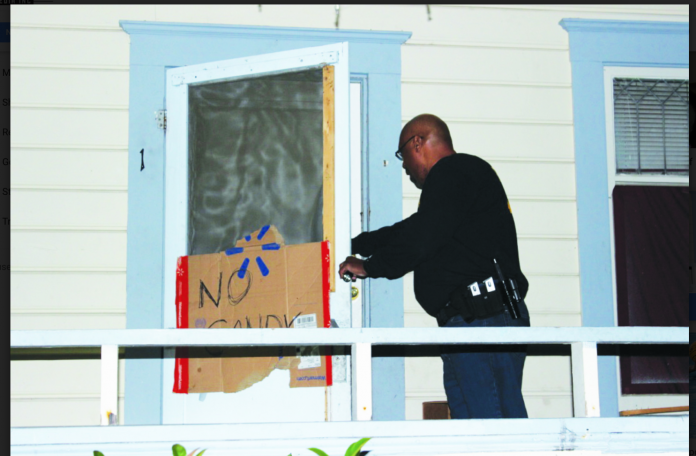On Halloween night, four state parole officers went trick or treating around Gilroy, but it wasn’t candy they wanted. Just the opposite.
They were paying visits to the homes of seven of the city’s 87 registered sex offenders to make sure they were complying with their terms of parole–they aren’t allowed to have decorations, toys or candy that might be used to lure a child during the holiday. Each parolee was convicted of a sex offense with a minor under 14 and has been released from prison.
The offenders are also forbidden from having alcohol. One offender was in violation of this rule; officers confiscated a case of beer and seven bottles of wine.
One of the homes had a cardboard sign posted on the door to underscore the parolee’s compliance: “No Candy.”
This was the 23rd annual “Boo Night” when parole officers spend the day checking in on offenders. They spent four hours in Gilroy visiting seven homes and made no arrests.
All of the men were wearing ankle monitors so officers can track them 24 hours a day.
There are 87 registered sex offenders in Gilroy, but the number could be higher because not everyone registers, said Lizette Ruano, the supervisor of the operation.
Jessica’s Law, or Proposition 83, which was passed in 2006, required sex offenders who have been convicted of a felony sex offense to be monitored by GPS devices for life. It prohibited any registered sex offender from living within 2,000 feet of any school or park–although it has since been found unconstitutional by the California Supreme Court.
It was troublesome for them to find places to live and they tended to collect in places like Gilroy.
“Any type of metropolitan place like San Jose or L.A., or big cities—there’s a park and school on every corner, so most of those guys go to an area that’s more rural,” said parole agent Ben Gibbs of San Jose, who worked in Gilroy on Halloween.
Santa Cruz with a population of 60,000, has 109 sex offenders; Monterey with 28,000 people has 75 and Morgan Hill has 46, with a population of 41,000.
“At the end of the day, these guys have to go somewhere,” said Ruano. “And if their home is in this county and this city, they’re typically going to be going back to family. And Gilroy is still somewhat reasonable to live in.”
One Gilroy offender had a case of Budweiser in the fridge, as well as a wine collection in the living room. He said it was his wife’s.
“If Gilroy PD had gone in, they would have arrested him,” said Ruano. “That wasn’t our purpose today. It’s ‘Operation Boo,’ and our purpose today is for him to follow conditions of parole—not passing out any candy, not displaying any Halloween decorations to children.”
Something as simple as a candy dish would have been grounds for an arrest.
One of the offenders they checked in with Monday lived in a Holloway Road trailer. His heater was on full blast and his small RV was simply and neatly put together. A horror film lit up the background. He said he and his wife have been married 32 years and asked the agents if he could return to his family’s home in Modesto for Thanksgiving.
“The issue is, that’s the county that your victims live in,” Ruano told him. “I’m gonna be honest with you, sir, that’s gonna be a no.”
She continued: “Some of these guys are not allowed to go back to the county that they committed their offense in. If the victim lives there and if the victim requests for them to not come back to the county. There’s forms that they can fill out. At any point in time. If the child is a minor, the parent can request for that.”
With the passing of Proposition 47 in 2014, non-violent offenders, including some sex offenders, were released into communities. Proposition 57, on the Nov. 8 ballot, could release more of them. This proposition allows for early release for non-violent felons, including and would authorize sentence credits for rehabilitation, good behavior and education.
The probation officers wouldn’t take a side on the issue, but one advised: “The voters should read the fine print.”














